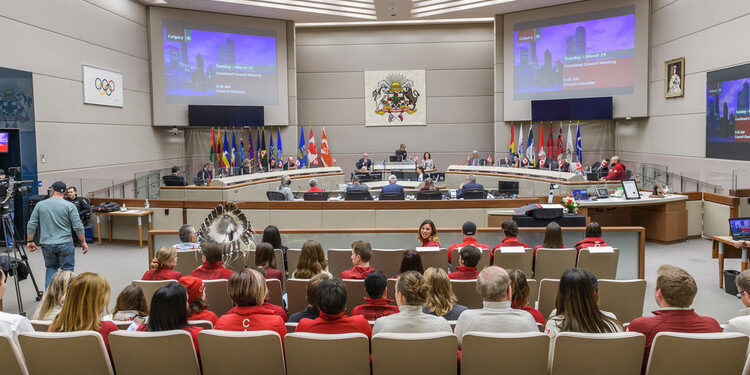Transparency Challenge returns to help push healthy democracy
 The Town of Whitby submitted its Plan Your Vote campaign initiative to the inaugural Transparency Challenge. This year’s campaign is welcoming submissions until May 31. Photo: Town of Whitby
The Town of Whitby submitted its Plan Your Vote campaign initiative to the inaugural Transparency Challenge. This year’s campaign is welcoming submissions until May 31. Photo: Town of Whitby
In 2023, the Information and Privacy Commissioner of Ontario launched the inaugural Transparency Challenge. The goal of the challenge was to share with the public innovative approaches to government transparency.
Based on the results of that initial effort, it seems the challenge has been a success. At least Patricia Kosseim thinks so.
Kosseim is Ontario’s Information and Privacy Commissioner. She said the first challenge – along with the Transparency Showcase that displayed the results of the initiative – saw 17 projects highlighted. In all, the commissioner’s office received 26 submissions. Kosseim said that number of submissions was “a wonderful turnout” for the first year.
Contributors to the challenge ranged from cities (Barrie, Brampton, Guelph, and Toronto) and towns (Ajax and Whitby) to provincial ministries (such as the Ministry of Health and the Ministry of the Attorney General) and public service organizations (including the Toronto and Waterloo police services and the Ontario Energy Board).
With contributors such as these, Kosseim said the challenge not only gained attention for the examples that were submitted, but also provided inspiration for other municipalities and organizations to follow.
Kosseim said she also hopes to bring out “the competitive spirit of public institutions” to be a part of the challenge in 2024.
“I’m hoping that it helps contribute in a small and incremental way, but in an increasing way, toward building a culture of transparency,” Kosseim said. “A culture that makes transparency sort of the go-to response as opposed to the hesitation to refrain, to keep data for oneself, or to stay secretive about one’s initiatives or actions or activities.”
Town of Whitby Participation
It is a mission that Chris Harris was eager to support.
Harris is Director of Legislative Services and Town Clerk at the Town of Whitby. The town submitted its Plan Your Vote campaign to the challenge. It would be later selected as one of the feature initiatives exhibited in the Transparency Showcase.
Harris lauded the Transparency Challenge for offering an opportunity to highlight the innovative ways that institutions can work within the existing framework and disclose information to the public. Given that “information and privacy is a highly legislative and regulated field,” Harris said it is essential that transparency be used to improve public awareness and discourse. And so, upon learning of the challenge, Harris said town officials were eager to contribute.
“There is amazing collaboration across the broader public sector and a willingness to share,” Harris said. “The Transparency Challenge just added to those existing opportunities to share ideas. There’s the opportunity for institutions that provide similar services to see what the innovative practices are occurring in their sector.”
Plan Your Vote
The Town of Whitby created an online navigation tool for the 2022 municipal election to help candidates share their platforms. It also gave electors easier access to candidate information to inform their voting decisions. Through the town’s new online tool, electors could then quickly and easily access their status on the voters’ list and voting location and obtain helpful, detailed information about municipal candidates.
Harris said that electors across Canada have indicated they are often too busy or not being informed on the issues as reasons for not voting. The ability for electors to get information can be challenging for a variety of factors. These factors include a decrease in local mainstream media coverage and the increasing fragmentation of online information sources.
This is why officials in Whitby wanted to do something that could assist electors in getting better information about election issues or to the candidates who are running. Harris noted Whitby isn’t the first to take such an approach to voter engagement. In fact, Whitby’s effort stems from a City of Vancouver initiative to build a vote planning platform that included candidate profiles.
After learning of the Transparency Challenge, Harris knew immediately that Plan Your Vote was the sort of initiative the commissioner was looking to spotlight.
“This isn’t a Whitby specific issue. We know that it’s affecting electors across Ontario and across Canada, feeling not informed about either the candidate’s running or the issues,” Harris said. “And so we thought (the Transparency Challenge) is a good opportunity for others to see what we had done and if they had an interest in it, contact us and we’d be happy to provide them with all the information.”
Widespread Interest in Open Data
Kosseim said her office has received a lot of positive comments about the challenge, including many of the showcase examples. She agrees that one of the key goals for the challenge is to spotlight how Ontarians can benefit from these types of open data initiatives. And how these efforts can work to not only disseminate data, but for it to be used to the greater benefit of all Ontarians.
The hope, Kosseim said, is that people in other communities are inspired by the models in the showcase to undertake their own initiatives. There are plenty more examples, Kosseim said. They just need to be brought out and communicated.
The other thing Kosseim was hoping for – and which was also supported by Harris – is that the showcase could provide a vehicle of communication to Ontarians to know these types of initiatives even exist.
“I’m hoping that this inspires institutions to talk about the great work that they do with data,” she said. “Of course, responsibly, non-personal data, but there are still many great examples and stories out there to be told. We’re hoping that this encourages them to tell those stories.”
Transparency and the Public Good
While understandably excited for the opportunity to share what Whitby was up to, Harris is also a fan of the mission of Kosseim’s office, too.
He believes there is a desire among those in the civil service to provide information that’s relevant to residents and to citizens. Now, they must work within the existing legislative and regulatory framework, but there are innovative things that can be done even within those constraints. To be sure, he added, there are challenges sometimes when municipalities are dealing with legislation that hasn’t been updated, sometimes in decades.
But even so – and perhaps now more than ever – it is essential that municipalities share information relevant to citizens. This is key, Harris said, in building trust with those who live in, or who have business with, municipalities. And ultimately, he added, this is key to the broader sectoral and societal challenges that are seen today around a deteriorating trust in government of all orders.
“Transparency and providing that information and making it readily available, is a way to some extent combat that,” Harris said. “You can show that this is what’s going on in government and to allow residents to ask those questions or to provide them with the information that they need.”
Key to a Healthy Democracy
Reflecting upon the inaugural challenge, Kosseim said she learned that any good idea is worth pursuing. But also, it takes perseverance and a lot of ingenuity to make things happen.
This is why she hopes both the exhibitors in the showcase, and the members of the public who are looking them up, will see the benefits of being proactive with the kinds of open data and open government initiatives that are possible. And that “if you use those muscles and you practice them,” being transparent becomes more second nature.
More importantly, particularly in this age of misinformation, Kosseim said she hopes public institutions learn that proactive disclosure provides the public with trust that governments are working for them and for their benefit.
“We need to be able to trust our government institutions. Otherwise, we’re just kind of floating aimlessly with no gravitational force as to what is the truth,” she said. “Governments and public institutions more broadly play a huge role in providing that anchor. For people to have confidence that they live in a healthy democracy, that their rights are being respected, and that the data is being used responsibly for their benefit and equally for the benefit of all Ontarians.”
For more information or to submit a project to the Transparency Challenge, visit https://www.ipc.on.ca/access-organizations/open-government/join-the-ipcs-transparency-challenge. MW
✯ Municipal World Executive and Essentials Plus Members: You might also be interested in Kane Faucher’s article: Council: It’s time for the talk.
Sean Meyer is digital content editor for Municipal World.
Related resource materials:



